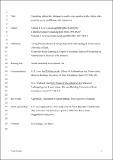Countering infanticide : chimpanzee mothers are sensitive to the relative risks posed by males on differing rank trajectories
Abstract
Objectives: Infanticide by males is common in mammals. According to the sexual selection hypothesis, the risk is inversely related to infant age because the older the infant, the less infanticide can shorten lactational amenorrhea; risk is also predicted to increase when an infanticidal male's chance of siring the replacement infant is high. Infanticide occurs in chimpanzees (Pan troglodytes), a species in which male dominance rank predicts paternity skew. Infanticidal male chimpanzees (if low-ranking) are unlikely to kill their own offspring, whereas those who are currently rising in rank, particularly when this rise is dramatic, have an increased likelihood of fathering potential future infants relative to any existing ones. Given that mothers should behave in ways that reduce infanticide risk, we predicted that female chimpanzees, and specifically those with younger, more vulnerable infants, would attempt to adjust the exposure of their infants to potentially infanticidal males. Specifically, mothers of young infants should reduce their association with adult males in general, and to a greater extent, with both low-ranking males and those rising in rank from a position where paternity of current infants was unlikely, to a rank where the probability of siring the next infant is significantly higher. We also investigated the alternative possibility that rather than avoiding all adult males, mothers would increase association with males of stable high rank on the basis that such males could offer protection against infanticide. Materials and methods: We examined data on female association patterns collected from the Budongo Forest, Uganda, during a period encompassing both relative stability in the male hierarchy and a period of instability with a mid-ranking male rising rapidly in rank. Results: Using linear mixed models, we found that mothers reduced their association with the rank-rising male, contingent on infant age, during the period of instability. We also found evidence that females preferentially associated with a potential protector male during the high-risk period. Discussion: Our results support the sexually selected hypothesis for infanticide and demonstrate that female chimpanzees are sensitive to the relative risks posed by adult males.
Citation
Lowe , A E , Hobaiter , C & Newton-Fisher , N E 2019 , ' Countering infanticide : chimpanzee mothers are sensitive to the relative risks posed by males on differing rank trajectories ' , American Journal of Physical Anthropology , vol. 168 , no. 1 , pp. 3-9 . https://doi.org/10.1002/ajpa.23723
Publication
American Journal of Physical Anthropology
Status
Peer reviewed
ISSN
0002-9483Type
Journal article
Description
A.E.L. was supported by a University of Kent Vice Chancellor's Scholarship. Data collection was funded by a grant to NNF from Harry Frank Guggenheim Foundation.Collections
Items in the St Andrews Research Repository are protected by copyright, with all rights reserved, unless otherwise indicated.

